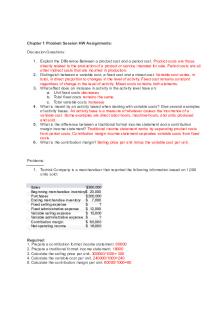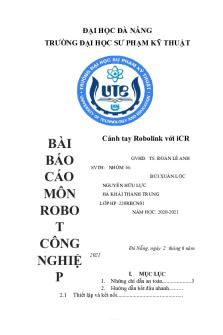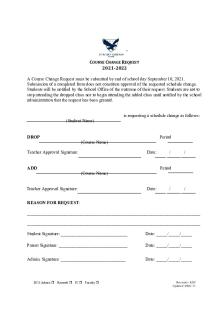ECS 220 FAPE and LRE PDF

| Title | ECS 220 FAPE and LRE |
|---|---|
| Author | Ashley Green |
| Course | Legal Aspects of Special Education with an Emphasis in Early Childhood |
| Institution | Grand Canyon University |
| Pages | 4 |
| File Size | 57.1 KB |
| File Type | |
| Total Downloads | 98 |
| Total Views | 122 |
Summary
Download ECS 220 FAPE and LRE PDF
Description
Ashley Green Legal Aspects of Special Education with an Emphasis on Early Childhood January 18, 2021 Diana Metzger, MS. Special Education
FAPE and LRE Free Appropriate Public Education, known as FAPE, and Least Restrictive Environment, known as LRE, are both components of the Individuals with Disabilities Education Act. Each of these components ensure that special education students get their best chance by receiving a fair and appropriate education. FAPE is broken down into four “pieces”. F stands for free, meaning that the government pays for the special needs student’s education with the exception of fees that general education students pay like sports or club fees. A stands for appropriate, meaning each student who qualifies is given an Individualized Education Plan or IEP, and some are given a 504, these plans are created to meet the needs of each student. P stands for public, meaning that the student’s education will be supervised by a public school, an IEP team, a teacher, and their family or guardian. In some cases the government may pay for a private education if deemed necessary. E stands for education, meaning special education but is not just limited to that. It also means any therapy the student may require such as speech or occupational. Services that the student needs would go under “education”. Least Restrictive Environment or LRE is not a place but more of a concept used To make sure that special education students are not left in the dark or isolated from the general education students. There are two types of LRE, inclusion and mainstream. Inclusion means that the general education class has more than one special needs student and that those students are included in the community of the general education classroom. The mainstream concept is when a special education student is the only one inside the general education
classroom. LREs are used to make sure that the student is interacting with general education students and is not restricted or isolated completely. It can be deemed necessary for a student to be placed outside of the general education setting if the student’s learning or “thinking difference” is severe enough that supplementary aides or services cannot provide the child with an appropriate education. Many court cases have arisen within the requirements of FAPE. Many School districts have deemed certain services as not services they must provide due to them not being written specifically into the FAPE guidelines. In the case of Alamo Heights Independent School District v. State Board of Education, a special needs student with multiple handicaps named Steven was the center of such an argument. Steven and his mother moved into the Alamo school district and his mother requested he be entered into the summer school program that the school had offered to moderately to severely handicapped children for years prior. Once his mother had requested this the administration in the school district made the decision that they would only offer one month of half day education and would not be providing transportation unlike in years past due to lack of interest by the teachers and other eligible students. That summer Steven stayed with a babysitter and his physical progression deteriorated. The following summer Steven’s mother applied for him to be accepted into the summer school program with transportation and her request was denied without any consultation. The only care she could find for Steven for that summer was a mile outside of the district. Steven’s mother chose to seek legal counsel on the matter since there was not a meeting with Steven’s IEP team nor his teachers when the decision was made to refuse him services. Upon a decision by the court, the school district was required to provide Steven summer services as well as transportation. School districts are not able to deny a child services due to out of district transportation. Many LRE cases have appeared as well. The case of Roncker v. Walter. Neill Roncker a nine year old boy that is severely intellectually disabled and takes medication for seizures was
approved to attend Arlitt Child Development Center where he could interact with non handicapped students his age. Neill’s IEP team decided that he should be sent to a public school instead where he would interact with other special education children. Neill’s parents were not pleased with the decision of the team and decided to seek legal counsel. During the hearing the court decided that the team did not provide enough information to warrant Neill being sent to a special education only class. The court said that he must be placed in the appropriate special education class within the public school district. During the time of the case Neill attended another school in which he was only able to interact with general education children minimal times a day. This again upset his mother and she filed another suit. The courts ruled in favor of the family stating that the services Neill required could feasibly be delivered within a general education classroom setting. The LRE was violated in this case with Neill being sent to a county school with only special education children and not having interactions with non disabled children. The IDEA has many components to it and can be interpreted in many different Ways. The various ways that each individual understands it or choses to understand it can have a huge impact on special education children and their futures. In many ways it has been seen to be stretched and bent around what way it can benefit the school district and make it the easiest for them. There are many gray areas due to not having set guidelines for each unique child. If everyone in special education will take the legal and ethical responsibility to do what is best for the child no matter what, then the child will be given their best chance at a bright future.
References
Latham, P. (2020, October 22). Download: FAPE at a Glance. Retrieved January 18, 2021, from https://www.understood.org/en/school-learning/your-childs-rights/basics-aboutchilds-rights/at-a-glance-free-and-appropriate-public-education
Morin, A. (2020, October 22). Least Restrictive Environment (LRE): What You Need to Know. Retrieved January 14, 2021, from https://www.understood.org/en/school-learning/specialservices/special-education-basics/least-restrictive-environment-lre-what-you-need-to-know
Roncker v. Walter. (n.d.). Retrieved January 23, 2021, from https://prezi.com/2i2cfnzzwk2l/roncker-v-walter/...
Similar Free PDFs

ECS 220 FAPE and LRE
- 4 Pages

HGG ECS 1 1er module
- 34 Pages

BIO-220 Biome and Ecosytem Essay
- 4 Pages

HLSC 220 formative quiz
- 14 Pages

SLK 220 - Chapter 11
- 9 Pages

Chapter 1 Accounting 220
- 3 Pages

Baocao RBCN 220 LLT
- 86 Pages

01-Ecs de Maxwell y Oempus
- 9 Pages
Popular Institutions
- Tinajero National High School - Annex
- Politeknik Caltex Riau
- Yokohama City University
- SGT University
- University of Al-Qadisiyah
- Divine Word College of Vigan
- Techniek College Rotterdam
- Universidade de Santiago
- Universiti Teknologi MARA Cawangan Johor Kampus Pasir Gudang
- Poltekkes Kemenkes Yogyakarta
- Baguio City National High School
- Colegio san marcos
- preparatoria uno
- Centro de Bachillerato Tecnológico Industrial y de Servicios No. 107
- Dalian Maritime University
- Quang Trung Secondary School
- Colegio Tecnológico en Informática
- Corporación Regional de Educación Superior
- Grupo CEDVA
- Dar Al Uloom University
- Centro de Estudios Preuniversitarios de la Universidad Nacional de Ingeniería
- 上智大学
- Aakash International School, Nuna Majara
- San Felipe Neri Catholic School
- Kang Chiao International School - New Taipei City
- Misamis Occidental National High School
- Institución Educativa Escuela Normal Juan Ladrilleros
- Kolehiyo ng Pantukan
- Batanes State College
- Instituto Continental
- Sekolah Menengah Kejuruan Kesehatan Kaltara (Tarakan)
- Colegio de La Inmaculada Concepcion - Cebu







